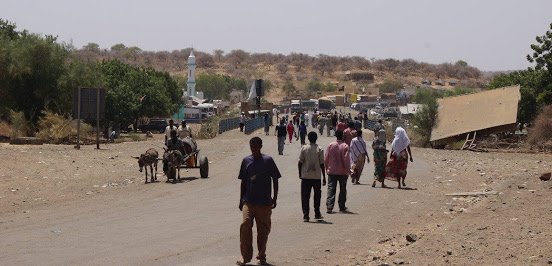Eritrea has pulled troops back from the heavily militarized border with Ethiopia as a “gesture of reconciliation” with its giant neighbor and long-time foe, the pro-government Eritrean Press agency said on its Facebook page.
“It is imperative for all those who care about the long-term stability and economic viability of the
region to do everything they can to help the two countries move beyond the senseless war that wrought
so much suffering on both people,” the agency said.
NAN reports that the Eritrean–Ethiopian border conflict was a violent standoff between Eritrea and Ethiopia as part of the violence in the Horn of Africa.
This included sporadic clashes of their militaries, some of which took part in the larger Second Afar Insurgency.
The border conflict had been ongoing since the Eritrean–Ethiopian War of 1998 to 2000, and included multiple clashes with numerous casualties, such as the 2016 Tserona clashes.
Ethiopia eventually stated in 2018 that it would cede Badme to Eritrea, which effectively ended the twenty-year conflict.
The two countries formally ended the conflict at the 2018 Eritrea–Ethiopia summit on 9 July 2018, by signing a joint agreement to resume peaceful diplomatic relations.
Eritrea achieved independence from Ethiopia in 1993, following a long armed struggle.
The two countries fought again between 1998 and 2000 over the disputed territory of Badme, costing an estimated 70,000 to 80,000 lives.
Also on Thursday, Ethiopia appointed its first ambassador to Eritrea in two decades in the latest sign of rapprochement after a border war, the state-affiliated Fana news agency said.
An online report from Fana said Redwan Hussien, formerly Ethiopian ambassador to Ireland, had become Addis Ababa’s representative in Asmara.
Since signing an agreement in Asmara on July 9 to restore ties, Eritrean and Ethiopian leaders have moved swiftly to sweep away two decades of hostility since conflict erupted between the two neighbours in the Horn of Africa in 1998.
The rapprochement was triggered by the coming into office of Ethiopia’s Prime Minister Abiy Ahmed in April who announced he wanted to implement a peace deal that ended the war.
Both leaders have visited each other and Eritrea’s Isaias Afwerki this week reopened his country’s embassy in Addis Ababa.
Ethiopia’s national carrier Ethiopia Airlines on Wednesday made its first flight to Asmara in two decades and was greeted by dancers waving flags and flowers as families separated by the war and the ensuing hostilities made an emotional reunion.
Reuters




